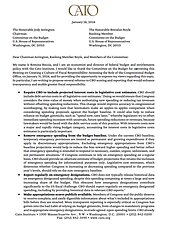- Require CBO to include projected interest costs in legislative cost estimates. CBO should include debt service costs in all legislative cost estimates.1 Doing so would ensure that Congress considers the time-value of money when authorizing new spending or reducing tax revenues without offsetting spending reductions. This change would improve accuracy in congressional scorekeeping, by making sure that lawmakers make an apples-to-apples comparison when considering spending proposals against the budget baseline. It could also help to reduce reliance on budget gimmicks, such as “spend now, save later,” whereby legislators try to offset immediate spending increases with uncertain, future spending reductions or revenues, because lawmakers would be faced with the debt-service costs of this practice. With interests costs now a major and rapidly rising budget category, accounting for interest costs in legislative costs estimates is particularly important.
- Remove emergency spending from the budget baseline. Under the current CBO baseline, temporary emergency provisions are treated as permanent and growing expenditures if they apply to discretionary appropriations. Excluding emergency appropriations from CBO’s baseline projections would help to reduce the bias toward higher spending and better reflect that emergency spending is intended to respond to necessary, sudden, urgent, unforeseen, and not permanent situations.2 If Congress continues to rely on emergency spending on a regular basis, CBO should provide an alternate estimate of budget projections that retains the inclusion of emergency spending for informational purposes only. Legislative cost estimates, which determine whether Congress is increasing or decreasing spending compared to the previous year’s levels, should rely on the non‐emergency baseline.
- Report regularly on emergency designations. CBO does not typically release historical data on emergency designated spending, despite this spending composing at times a large and now increasing share of the budget. This obscures how emergency designations contribute significantly to the US fiscal challenge. CBO should report regularly on emergency designated spending, including by providing historical data in relevant CBO reports.3
- Make appropriations scores publicly available. Members of Congress and the public deserve to receive complete, and easily digestible information about what’s included in appropriations bills before they are enacted. More transparent reporting is especially critical as Congress has gotten into the bad habit of relying on budget gimmicks, from changes to mandatory programs and inappropriate emergency designations, to evade agreed-upon spending limits. CBO already produces detailed reports for appropriations bills, but they are only available to a limited audiences, including leadership and select committees. Making these reports publicly available would enhance transparency and allow for greater accountability in the service of fiscal restraint. Alongside account-level and aggregate budget authority and outlays, CBO should also include information about changes in mandatory programs (CHIMPs), emergency designations, and other exclusions to enforceable spending allocations.
- Require the use of fair-value accounting for federal credit programs. The current approach to report the financial impact of government-sponsored enterprises4 and other federal credit programs fails to properly account for the market risk of default, distorting the federal government’s fiscal picture. Congress should require CBO to analyze federal loan and credit programs using the same method as used by the private sector. CBO is already performing a valuable service by producing informational reports that compare estimates based on Treasury yields and market yields. Congress should amend the Federal Credit Reform Act of 1990 to formally incorporate fair-value estimates in accounting for federal credit programs.
- Require CBO to produce legislative cost estimates based on a more realistic alternative baseline scenario. The current-law baseline makes unrealistic assumptions that are not based on historical experience, such as assuming that time-limited tax cuts will be allowed to expire. CBO should produce a more realistic alternative baseline which would paint a more accurate fiscal picture and reduce the tendency to use temporary provisions or gimmicky offsets to reduce the perceived fiscal impact of policy changes. Relying on an alternative baseline provides better estimates of actual congressional intent from which to assess the future fiscal situation and score policy changes.5


